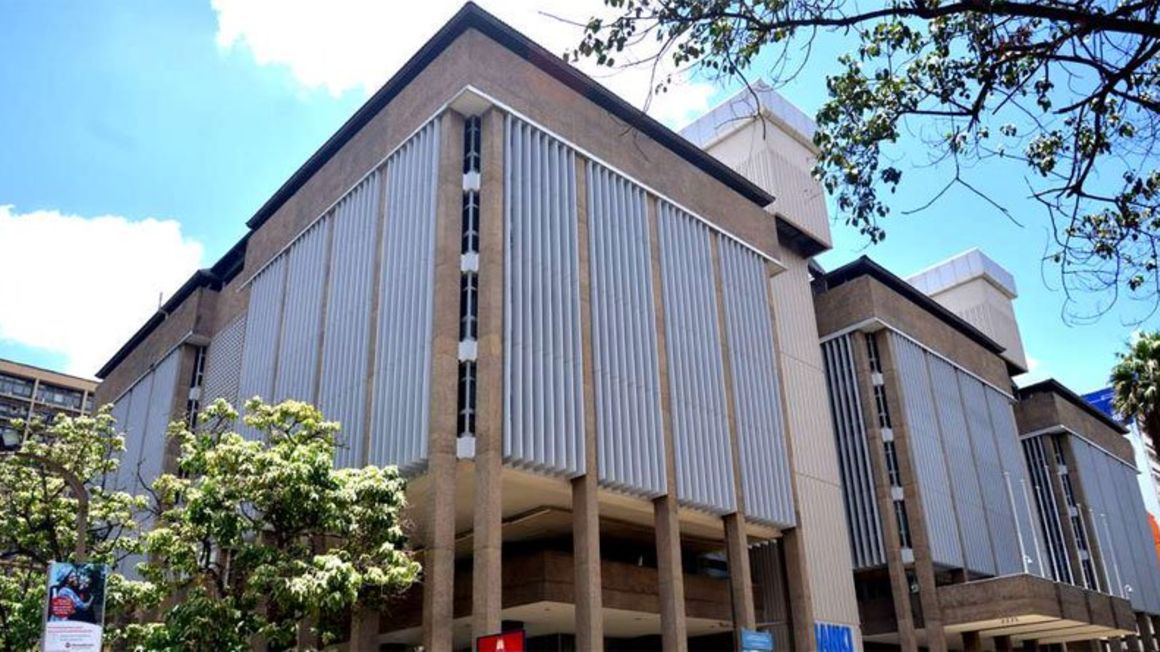
Central Bank of Kenya. FILE PHOTO | NMG
Summary
- Latest Central Bank of Kenya (CBK) data show that the non-performing loans (NPLs) dropped to Sh418.3 billion in June from a peak of Sh442.2 billion in February.
- This marked the fourth month in a row that defaulted loans had dropped dropped amid a recovery of the economy from the effects of the pandemic.
The size of defaulted bank loans dropped by Sh25.9 billion in the four months to June on increased property auctions and repayment of non-performing debt.
Latest Central Bank of Kenya (CBK) data show that the non-performing loans (NPLs) dropped to Sh418.3 billion in June from a peak of Sh442.2 billion in February, offering reprieve to lenders.
This marked the fourth month in a row that defaulted loans had dropped dropped amid a recovery of the economy from the effects of the pandemic, which triggered mass defaults.
Workers and businesses defaulted on additional Sh95 billion worth of loans in the year to February, when bad loans hit a historic peak.
The mounting defaults were a reflection of the struggles of workers and businesses in an economy recovering from a coronavirus-induced slump, which triggered job cuts and business closures.
The ratio of defaulted credit to gross loans fell to an eight-month low to 14 percent last month from 14.55 percent in March —the highest ratio since July 2007.
Banks that had gone slow on property seizures last year following the pandemic have stepped up debt recovery efforts to clean up their loan books, leading to a spike in auctions.
Manufacturing, agriculture, trade and real estate sectors led in the repayments and recoveries.
“It is important to appreciate that both of these (recoveries and repayments) are happening. This actually shows that banks are working with their customers,” said CBK Governor Patrick Njoroge Thursday.
Repayments are on the back of a recovering economy, which has seen firms scale up operations, hire more staff and reverse pay cuts initiated last year at the peak of Covid-19.
Default on mortgages and loans advanced to the transport sector crossed the Sh100 billion mark in the wake of layoffs, business closures and travel restrictions triggered by the pandemic.
The transport and real estate sectors topped loan defaults over the nine months to December last year as the country reeled from the economic crisis.
Industries and other businesses had cut down on their activities in response to the infectious disease, leading to job cuts and unpaid leave for retained staff as profitable firms move into losses.
This saw workers who had tapped mortgages and unsecured loans for purchase of goods such as furniture and cars and expenses like school fees default. Unsecured loans are given on the strength of one’s salary.
Businesses that tapped loans based on their projected cash flows are also struggling to meet the loan obligations.
Loans secured through title deeds and motor vehicle logbooks posted the fastest default growth rates over the period, coinciding with crippling travel restrictions and scaled-down business operations to curb the spread of Covid-19.
Auctioneers say they held more sales this year compared to the second half of last year, arguing that banks are moving much faster to seize properties from defaulters.
There has been a glut of repossessed homes, cars and office blocks on the market, which bankers are struggling to sell in Kenya’s soft economy.
Now, auctioneers say that there has been improvement in selling the seized properties including houses and cars following the gradual economic recovery, which has raised purchasing power.
Banks are also embracing private treaties—where distressed borrowers agree with lenders to look for the best available price for their properties and sell to repay loans as opposed to relying on the auctioneer’s hammer.
The move has given banks room to get around the Land Act 2012, which bars them from auctioning seized assets at below 75 percent of the prevailing market value.
“Sales through auctions are improving but are still low. But there is increased partnership between the banks and the debtors on how to sell the properties jointly,” said George Muiruri of Leakey’s Auctioneers.
“Banks have noted that the movement of these properties through auctions is not as fast as they would want and so the multiple approach (of auctions and private treaties) is what is working.”
Real estate, agriculture, tourism, restaurant and hotels had between January and March seen the sharpest jump in skipped loan repayments, prompting banks to aggressively target these same sectors with auctions and payment reminders.
Loan defaults in real estate had jumped by 14.8 percent from Sh61.4 billion in December to Sh70.5 billion in March.
The pace of growth in defaults in the sector was the highest followed by agriculture (10.7 percent), tourism, restaurant and hotels (7.3 percent), mining and quarrying (4.9 percent) and energy and water (4.1 percent).


No comments:
Post a Comment